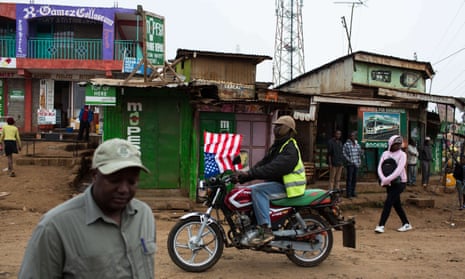Last week, Kenya’s highly respected auditor general, Edward Ouko, released an annual audit of government accounts. An uproar immediately followed as the scale of mismanagement of public funds became clear. Only 1.2% of the country’s 2013-14 $10bn (£6.4bn) budget was correctly accounted for. About $600m could not be accounted for at all.
The regime of President Uhuru Kenyatta has allowed the most permissive environment for corruption in Kenya’s history. Following the report’s publication, observers were soon speculating about the possibility that a considerable chunk of the missing funds had been pocketed. This is partly because the economy has grown and there is more to “eat”, as corruption is called in Kenya. More eating is being done than at any time since we started trying to measure graft in the 1990s.
Indeed, corruption has become the most talked about malaise in the country, with weekly headlines about new scandals. Kenya has continued to slide down Transparency International’s corruption perception ndex . On 3 August, Kenya’s chief justice Willy Mutunga sounded the alarm that corruption was creeping back into the judiciary as well – the first time the highly respected official has made such a claim publicly.
Ironically, when it comes to condemning corruption, Kenyatta is the most articulate head of state Kenya has had. His problem is partly that this talk has become cheap, given the scale and number of scandals since he took office. Corruption was an oft-revisited subject during Barack Obama’s recent visit to Kenya. As he left, the White House uploaded a comprehensive anti-corruption plan to be implemented with American assistance. This is potentially a step forward, as it would mark the first time the current regime has had any kind of coherent strategy to deal with corruption.
Observers found it curious that this plan seemed to pop up first on the White House website. The government in Nairobi is the most sophisticated in the country’s history when it comes to spinning new initiatives as signs of progress and suppressing bad news. Yet, so far, Kenyan officials have been notably low key in endorsing or talking up what seems to be a significant bilateral governance initiative with the US. This may be because the government spent its first 18 months in office on the offensive against “interfering”, “imperialist” powers like the UK and the US. This has been seen as payback for those countries’ ostensible support for the International Criminal Court at a time when the Kenyan president and his deputy both faced charges of crimes against humanity in relation to the violence that followed the 2007 election.
Things have clearly changed since then. In addition to the US plan, the Kenyan government has also enlisted the help of the former British prime minister Tony Blair to set up a delivery unit for the president. Optimists point out that all these initiatives combined could do some good for Kenya at a time when corruption has spread so wide and deep that it has undermined the government’s capacity to deal with the deadly menace of jihadist terror, deliver basic services and even keep its own manifesto promises. Corruption is hollowing out key governance institutions like the judiciary and civil service.
It is highly unusual for even nominally democratic governments in developing countries to start fighting corruption midway through their term. This is in part because if you haven’t put the infrastructure in place to deal with graft in your first 24 months, the next political cycle kicks in. Historically, a sharp spike in corruption has always accompanied the political “fundraising” that follows. Political will to deal with graft declines exponentially as the elite realigns and reconfigures to face the next poll.
Whether the American project ends up as a false dawn remains to be seen. It is slightly curious that it took the Kenyan presidency a week to issue any statement publicising the initiative. Still, it does include reform elements that Kenya desperately needs. Over the past six months, significant foreign investors have taken the unprecedented step of going public with their travails at the hands of corrupt officials. This is in addition to the hollowing out of sections of the security sector, undermining Kenya’s capacity to deal with increased insurgency.
Combined with the shrinkage in democratic space, especially for media and civil society, all this makes for troubling times ahead on the democratic front. When reversals in basic freedoms are accompanied by burgeoning corruption, one can be allowed scepticism about the sincerity of official anti-corruption rhetoric and well-written plans.
